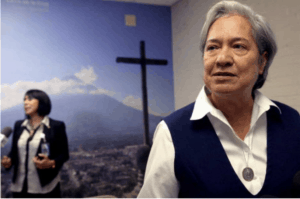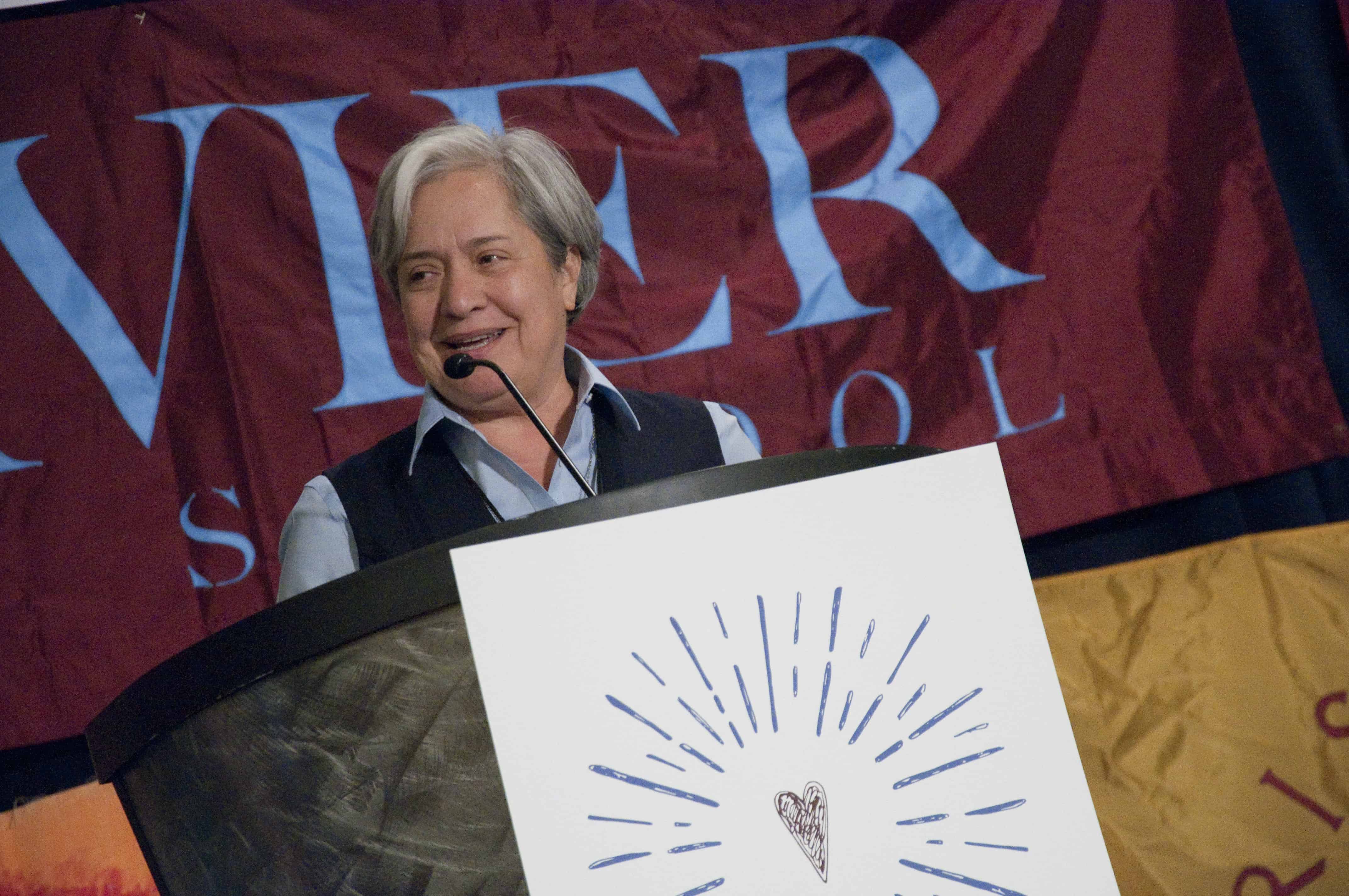This past weekend Bill McCormick, SJ, sat down at the Ignatian Family Teach-In with Sister Norma Pimentel, MJ, the Executive Director of Catholic Charities of the Rio Grande Valley in Texas. Sister Norma became famous after her encounter with Pope Francis on international TV, and was a keynote speaker at this year’s Teach-In.
You’re a celebrity here at the IFTJ. How does that feel?
It feels great. But at the same time, if I stop to think about why I’m getting all of this attention, it makes me feel uncomfortable, because it comes from the suffering and pain of so many families. But the publicity brings attention to these problems. It emphasizes that there is a lot of pain and suffering.
I’ve received so much recognition. It’s almost as though now people hear me, that I have a voice. And so, I think that voice comes with big responsibilities, of saying what it is that we all should know and do, from what I see in my own life from helping families and how others must do the same.
How did you decide to enter religious life?
That’s some time back! I didn’t decide for myself, but God decided to pull me out of whatever direction I had made up my mind I was going in.
I was all set on pursuing my professional career as an artist. I stopped to take some time back home so that my dad would be okay with me moving on. In the meantime, I went to a prayer group, and in that prayer group that’s where things changed for me. For the first time experiencing the presence of God in a very special way that caught my attention. And it caught my attention so profoundly that my life took a 180 degree turn to get more involved with knowing God and serving Him with a religious community. A local religious community invited me a vocational retreat, and the rest is history.
Did you have a sense for what God was calling you to do specifically?
No, it was all an unknown future for me. All I knew was that I knew it was the right thing to do. And I wanted to know more about God and what it meant to serve Him. It was something that was unfolding in my life and I wanted to explore it and allow God to guide me. And that’s where it all started. It has been an interesting journey of discovery and living out my faith and growing in my faith as I move forward. I allow God to guide me in what I do and who I am.
What has it been like to be a leader in the Church as a woman?
I think it’s important to be yourself, and not be afraid to be anything other than yourself and who God is forming you to become. It helps to be able to relate with those whom you work with, and who you are inviting to respond to whatever it is that God put before you. The sense of respect for one another, that we may agree on some things and disagree on others, but that in those things that we do agree we can work together and that we make a difference together in responding to whatever it is before us. We focus on what we both believe is the right thing to do. That’s how thing start to happen.
You mentioned about being a woman, and that can get in the way when you think that we might not be recognized or respected because we’re women, but I believe from my own experience and what has happened since becoming so involved in Catholic Charities that people have come to respect me for who I am and not because I’m a woman or a religious or anything other than that we are doing the right thing. And I hope it’s because of that. Or maybe it’s a little bit of everything!

Conversations about immigration are difficult. How do you approach them?
I recently spoke at a gathering of consulates where I was one of two speakers, along with the head of Border Patrol. And he presented the border security importance of what his job was. And when I spoke, I said that I was going to talk about another vital element of life on the Border and work with immigrants: the need to respond humanely,and the reality we see in the Rio Grande Valley. The humanitarian aspect and reality for families who are entering this country fleeing persecution. I think some people need to spend one day with me and see for themselves. I think the power of such an encounter would really open many hearts and minds to the human reality of families desperately seeking protection..
What would they see if they spent a day with you?
They would see the presence of God right there. That’s why those who volunteer, something happens to the person who sees the families, the children, the mothers, and responds to reach out and help them. And that moment of connection when both of them come together and meet: right at that moment I believe that God becomes present. They experience it. I heard recently someone came to me and said, “I’m not Catholic. When you started this humanitarian movement, there was a friend of mine who was a very successful attorney who went to see what you were doing at Sacred Heart and became involved. And it changed him so much that he left his career and joined the seminary.” Another individual recently said to me, “Sister, I have been away from the Church, and since my experiences of helping these families, I’ve come back to the Church.” To me – these are extremely powerful experiences. I think that it’s God who becomes present to them in their lives, and that’s why it happens.
The RGV is unique place that many don’t know about. What would you say to people who don’t know anything about how God works on the border?
In our everyday lives, the Valley is obviously very unique and different. Even the way we speak is different… We tend to speak both languages at the same time! In any case, God becomes present to us in our daily life in the simple things of carrying on and understanding that some of our community live on both sides of the border.
Before 9/11, it was so common to go back and forth, half of your family on the U.S. side and half on the Mexican side. Now it’s so difficult to go back and forth. To realize the anguish and fear among the families, that you may have family members on the Mexican side, and worried about them because of the cartels and gangs and things like that. You hear the stories and you can only be in solidarity with their pain, and know that it is not easy for them to live that life. Those are the realities for many families in South Texas.
At the same time, it is a community that celebrates life and their faith. You see that when it comes to celebrating Advent, Christmas or Ash Wednesday, especially Ash Wednesday! Everyone seems to go to church on that day. When someone dies in the family. Those are special moments when we become one with each other. They help us feel that we are one with God and one with one another, and we stand together with whatever we have to live.
What dreams do you have for the Church in the future?
I believe that we must stand together in the values and principles that we believe in, that we should not hold back from speaking out and living our faith, especially when we see things that are not right. Our responsibility as Christians is to defend the rights and dignity of those who are most vulnerable and powerless in our society, and it’s not okay to be quiet. Sometimes fear can blind us to true reality that we are all one in God. As one people we can stand together and feel the courage to do what is right: that is what the Church of tomorrow should be like.
What do you think about Pope Francis?
Oh, he’s a wonderful man. He models for us how to be true to who we are as Christians, our calling. He embodies the word mercy, and he calls us to do the same.
Do you have any advice for the new president?
I support and pray for our new President so that he and all lawmakers will work for the common good in our country and in our world. I encourage everybody to support and prayer for our new leader as the answer is never to be angry or violent. That only drives us further apart.
I hope all elected officials will work for humane policies that are just and fair and reflect the needs of all people. Immigrants who are victims of crimes and violence are especially in my heart and in my prayers.
What has your experience been of the Ignatian Family Teach-In for Justice?
I’m excited to hear the enthusiasm of the youth, and their excitement that they have. That is so motivating, and so wonderful and inspiring. I wish I was young in this time, where there is so much to do. Wouldn’t that be wonderful?
I think that what I’ve done is only be an instrument of God, to do what He has designed for me in my life. I’m glad that it can be of good help to others.


